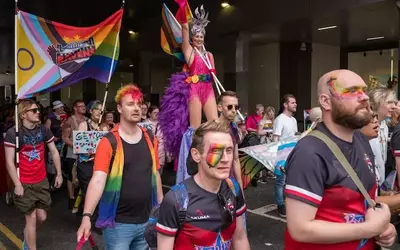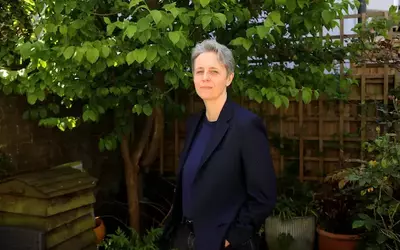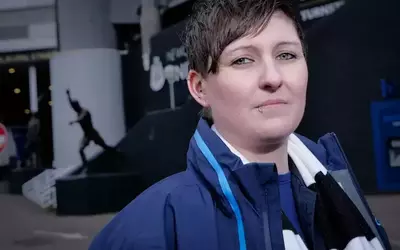Martin Evans
Crime Editor
16 July 2025 4:23pm BST
A police force failed to act impartially when it allowed officers to take part in a Gay Pride and transgender rights march, a court has ruled.
Linzi Smith, 34, a gender-critical lesbian, brought a case against Northumbria Police after officers, including Vanessa Jardine, the head of the force, took part in last year’s parade in Newcastle.
Ms Smith brought a judicial review, arguing that it was wrong to allow uniformed officers to actively participate in an event that promoted gender ideology and was supported by transgender activists.
Responding to the ruling, Ms Smith said: “I am delighted with the judgment of the court. It is terrifying to live in a community where the police have abandoned their duty of impartiality and embraced a highly controversial political cause.”
In the legal claim, officers, including the chief constable, were accused of joining in the march; stationing a police van decked out in Pride colours at the event and associating with messaging that supported gender ideology.

Northumbria Police was wrong to join the Pride march, a judge has ruled Credit: Ian Forsyth
The hearing was told there was also a Northumbria Constabulary static display staffed by uniformed officers and a transgender pride flag incorporating the force’s insignia.
Ms Smith argued that while she accepted it was necessary for the Pride march to be policed it was wrong for officers to actively participate because it breached their professional oath to operate with impartiality.
Allowing the judicial review, Mr Justice Linden said: “The fact that the officers had publicly stated their support for transgender rights by taking part in the 2024 march would be likely to give the impression that they may not deal with the matter fairly and impartially.”
He went on: “It is not hard to imagine circumstances in which the officers in question might be called on to deal with a clash between gender critical people and supporters of gender ideology, and therefore situations where the former had cause for concern as to whether they were being dealt with impartially.”
The court also heard how during the march there were pro-Palestinian protesters chanting slogans such as: “From the River To The Sea, Palestine Will Be Free”, “No Pride in Genocide” and “Toute le monde deteste la police”.
The case was supported by Kathleen Stock, a gender-critical professor, and Harry Miller, co-founder of the campaign group Fair Cop, which seeks to “remove politics from policing”.
Professor Stock said: “For me, the sight of the Northumbria Police either participating in Pride marches, supporting Pride events in public statements, or using or encouraging the use of Progress or rainbow flags, emblems, lanyards or other symbols associated with trans causes in a public-facing way, conveys its support for gender ideology.
“If that is not the force’s intention, it is certainly its effect.”

Kathleen Stock said the force’s actions conveyed its support for gender ideology Credit: Clara Molden
It is not clear how the ruling will impact on the force’s plans to police this year’s event in the city this weekend.
Mr Miller said: “The significance of this ruling means that in future the police will attend events like this at their peril.
“But it is sad that we had to go to court to challenge something that was so blindingly obvious.”
In his concluding remarks the judge said the findings only related to the 2024 event, adding: “It will be a matter for the Defendant to consider, in the light of what I have said in this judgment, whether her current proposed approach to the 2025 Event should remain as it is.”
In a statement following the ruling, a spokesman for Northumbria Police said: “The officers, staff and volunteers of Northumbria Police are dedicated and passionate about providing each and every person of our wonderful region with an outstanding policing service.
“In doing so, we recognise not all communities share the same level of confidence in policing for a variety of reasons. We want to ensure everyone knows that we are absolutely here for them when they need us.
“Part of that is us being visible in those communities and playing an active part in our force area. Throughout the year, we will have an important role to play in a variety of events, including parades and festivals.
“During these events while our primary aim is to keep people safe, it also provides us with an opportunity to engage with people including those who may have less confidence in policing. It is vitally important they feel supported and we continue to build their trust in us.
“That is why we felt it important to challenge the case which was brought against us and which has implications for wider policing.
“We will work through the ruling to understand the implications, while staying true to our values of fairness, visibility, and support for all.”
Other forces are currently looking at the ruling to see how it could impact on their approach to the policing similar events.
Gavin Stephens, chairman of the National Police Chiefs’ Council, said: “Every week police officers and staff will as part of their duties take part in thousands of events up and down the country, from community events at village halls through to large scale events like carnivals, parades and festivals.
“However, we recognise that policing must also maintain its impartiality, including in the types of events it supports and plays an active part in.
“We are working through the detail of this judgment and will ensure this decision is communicated to forces for them to consider.
“We are also working with the College of Policing on broader guidance which will help local forces make decisions around participation in events to maintain their impartiality.
“Policing values all our communities and will continue to police in a way that aims to build trust and confidence, including among those who have less confidence in our service.
“This is the cornerstone of good policing and especially neighbourhood policing. Our desire to ensure we recognise and provide good policing for all communities will remain unchanged.”

Ms Smith was banned from attending matches at St James’s Park Credit: Mark Pinder
Earlier this year Northumbria Police apologised to Ms Smith, who is a season ticket holder at Newcastle United, following an investigation that took place when she expressed gender critical views on social media.
She was accused of being transphobic by a complainant who told Newcastle United that trans people would not feel safe sitting near her.
A hate crime investigation was launched and she was banned by the club.
Northumbria Police later admitted crucial elements of their investigation into claims she had committed a hate crime were not acceptable.
It said that while there was no misconduct by its officers, the way they handled her case and similar hate crime reports in future should be subject to further training.
Source (Archive)
Crime Editor
16 July 2025 4:23pm BST
A police force failed to act impartially when it allowed officers to take part in a Gay Pride and transgender rights march, a court has ruled.
Linzi Smith, 34, a gender-critical lesbian, brought a case against Northumbria Police after officers, including Vanessa Jardine, the head of the force, took part in last year’s parade in Newcastle.
Ms Smith brought a judicial review, arguing that it was wrong to allow uniformed officers to actively participate in an event that promoted gender ideology and was supported by transgender activists.
Responding to the ruling, Ms Smith said: “I am delighted with the judgment of the court. It is terrifying to live in a community where the police have abandoned their duty of impartiality and embraced a highly controversial political cause.”
In the legal claim, officers, including the chief constable, were accused of joining in the march; stationing a police van decked out in Pride colours at the event and associating with messaging that supported gender ideology.

Northumbria Police was wrong to join the Pride march, a judge has ruled Credit: Ian Forsyth
The hearing was told there was also a Northumbria Constabulary static display staffed by uniformed officers and a transgender pride flag incorporating the force’s insignia.
Ms Smith argued that while she accepted it was necessary for the Pride march to be policed it was wrong for officers to actively participate because it breached their professional oath to operate with impartiality.
Allowing the judicial review, Mr Justice Linden said: “The fact that the officers had publicly stated their support for transgender rights by taking part in the 2024 march would be likely to give the impression that they may not deal with the matter fairly and impartially.”
He went on: “It is not hard to imagine circumstances in which the officers in question might be called on to deal with a clash between gender critical people and supporters of gender ideology, and therefore situations where the former had cause for concern as to whether they were being dealt with impartially.”
The court also heard how during the march there were pro-Palestinian protesters chanting slogans such as: “From the River To The Sea, Palestine Will Be Free”, “No Pride in Genocide” and “Toute le monde deteste la police”.
The case was supported by Kathleen Stock, a gender-critical professor, and Harry Miller, co-founder of the campaign group Fair Cop, which seeks to “remove politics from policing”.
Professor Stock said: “For me, the sight of the Northumbria Police either participating in Pride marches, supporting Pride events in public statements, or using or encouraging the use of Progress or rainbow flags, emblems, lanyards or other symbols associated with trans causes in a public-facing way, conveys its support for gender ideology.
“If that is not the force’s intention, it is certainly its effect.”

Kathleen Stock said the force’s actions conveyed its support for gender ideology Credit: Clara Molden
It is not clear how the ruling will impact on the force’s plans to police this year’s event in the city this weekend.
Mr Miller said: “The significance of this ruling means that in future the police will attend events like this at their peril.
“But it is sad that we had to go to court to challenge something that was so blindingly obvious.”
In his concluding remarks the judge said the findings only related to the 2024 event, adding: “It will be a matter for the Defendant to consider, in the light of what I have said in this judgment, whether her current proposed approach to the 2025 Event should remain as it is.”
In a statement following the ruling, a spokesman for Northumbria Police said: “The officers, staff and volunteers of Northumbria Police are dedicated and passionate about providing each and every person of our wonderful region with an outstanding policing service.
“In doing so, we recognise not all communities share the same level of confidence in policing for a variety of reasons. We want to ensure everyone knows that we are absolutely here for them when they need us.
“Part of that is us being visible in those communities and playing an active part in our force area. Throughout the year, we will have an important role to play in a variety of events, including parades and festivals.
“During these events while our primary aim is to keep people safe, it also provides us with an opportunity to engage with people including those who may have less confidence in policing. It is vitally important they feel supported and we continue to build their trust in us.
“That is why we felt it important to challenge the case which was brought against us and which has implications for wider policing.
“We will work through the ruling to understand the implications, while staying true to our values of fairness, visibility, and support for all.”
Other forces are currently looking at the ruling to see how it could impact on their approach to the policing similar events.
Gavin Stephens, chairman of the National Police Chiefs’ Council, said: “Every week police officers and staff will as part of their duties take part in thousands of events up and down the country, from community events at village halls through to large scale events like carnivals, parades and festivals.
“However, we recognise that policing must also maintain its impartiality, including in the types of events it supports and plays an active part in.
“We are working through the detail of this judgment and will ensure this decision is communicated to forces for them to consider.
“We are also working with the College of Policing on broader guidance which will help local forces make decisions around participation in events to maintain their impartiality.
“Policing values all our communities and will continue to police in a way that aims to build trust and confidence, including among those who have less confidence in our service.
“This is the cornerstone of good policing and especially neighbourhood policing. Our desire to ensure we recognise and provide good policing for all communities will remain unchanged.”

Ms Smith was banned from attending matches at St James’s Park Credit: Mark Pinder
Earlier this year Northumbria Police apologised to Ms Smith, who is a season ticket holder at Newcastle United, following an investigation that took place when she expressed gender critical views on social media.
She was accused of being transphobic by a complainant who told Newcastle United that trans people would not feel safe sitting near her.
A hate crime investigation was launched and she was banned by the club.
Northumbria Police later admitted crucial elements of their investigation into claims she had committed a hate crime were not acceptable.
It said that while there was no misconduct by its officers, the way they handled her case and similar hate crime reports in future should be subject to further training.
Source (Archive)



